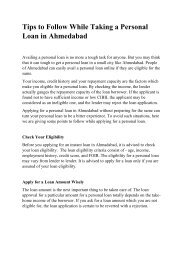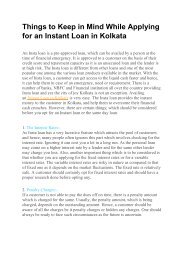How to add Co-owner to Your Property
The house can be sold only if both the co-owners are ready for it. As both the co-owners can avail the tax benefits so whenever the house will be sold both has to pay tax on the capital gains earned by them. Blog: http://www.gorelations.com/blogs/2559/27037/how-to-add-co-owner-to-your-property Apply For Loan: https://financebuddha.com/home-loan Facebook :https://www.facebook.com/financebuddha Twitter:https://twitter.com/financebuddha
The house can be sold only if both the co-owners are ready for it. As both the co-owners can avail the tax benefits so whenever the house will be sold both has to pay tax on the capital gains earned by them.
Blog: http://www.gorelations.com/blogs/2559/27037/how-to-add-co-owner-to-your-property
Apply For Loan: https://financebuddha.com/home-loan
Facebook :https://www.facebook.com/financebuddha
Twitter:https://twitter.com/financebuddha
You also want an ePaper? Increase the reach of your titles
YUMPU automatically turns print PDFs into web optimized ePapers that Google loves.
Gift Deed- One can give the <strong>owner</strong>ship of the property by gifting it <strong>to</strong> someone. if you want<br />
<strong>to</strong> gift a share of your property, you will need <strong>to</strong> execute a gift deed on a stamp paper at the<br />
property registrar's office. Again the thing <strong>to</strong> be noticed is that a gift <strong>to</strong> a relative is not<br />
taxable in India. If the gift goes <strong>to</strong> a non-relative, the value of the house is treated as income<br />
and an income tax will be applicable according <strong>to</strong> the income tax rules for the relevant year.<br />
The registration charges and the stamp duty charges are lower than a sale deed. One has <strong>to</strong><br />
pay a stamp duty charge which is generally 2% of the value of the property, along with 1%<br />
registration charge.<br />
The Tax Saving on Home Loan which is taken jointly is possible only if both the coapplicants<br />
are co-<strong>owner</strong>s <strong>to</strong>o. A co-<strong>owner</strong> of a property has the authority <strong>to</strong> decide whether<br />
the house will be used for the residential purpose or <strong>to</strong> be used for commercial purpose. The<br />
house can be sold only if both the co-<strong>owner</strong>s are ready for it. As both the co-<strong>owner</strong>s can avail<br />
the tax benefits so whenever the house will be sold both has <strong>to</strong> pay tax on the capital gains<br />
earned by them.


















